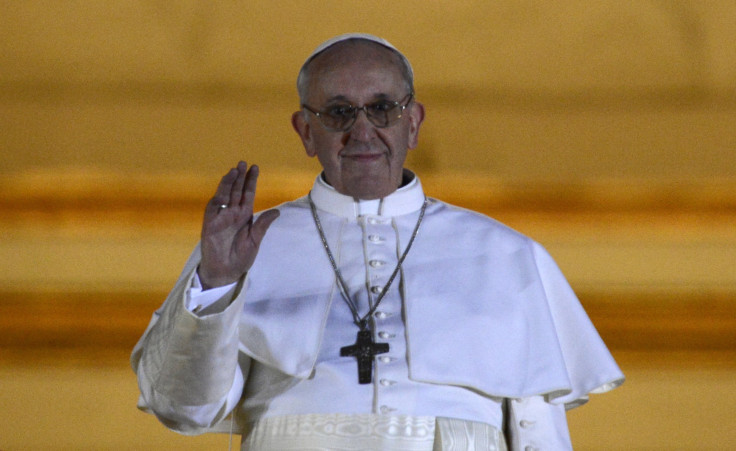Pope Francis: Jews Around The World Welcome New Pontiff, Hope For Renewed Catholic-Jewish Cooperation

Jews around the world have welcomed the election of Cardinal Jorge Mario Bergoglio as Pope Francis, citing his good relationship with the Jewish community in his native Argentina.
"We welcome Pope Francis ... to his new role as leader of the Catholic Church," said B'nai B'rith International President Allan J. Jacobs in a statement.
"Catholic-Jewish relations had remained a focus of Pope Benedict XVI, and we look forward to continuing the solid foundation that already exists for interfaith dialogue."
Moreover, on his very first day on the papal throne, Francis wrote a letter to the chief rabbi of Rome, Professor Riccardo Di Segni, in which he promised "renewed collaboration" with Jews.
Agence France-Presse reported that in that letter the pope declared: "I sincerely hope I can contribute to the progress there has been in relations between Jews and Catholics since the Second Vatican Council in a spirit of renewed collaboration," referring to the famous council from the early 1960s which, among other things, absolved Jews of responsibility in the death of Jesus Christ and also spoke out forcefully against anti-Semitism.
Rabbi David Rosen, international director of interreligious affairs at the American Jewish Committee, told Religion News Service that as Cardinal Bergoglio, the archbishop of Buenos Aires "has had a warm relationship with the Jewish community of Argentina, and enjoyed close friendships with many prominent rabbis.”
Francis was also commended for his actions in 1994 when a Jewish center in Buenos Aires was bombed, killing 85 people and wounding hundreds – an act allegedly perpetrated by Iranian-backed Hezbollah militants. (The bombing still has not been properly investigated, much less solved, although Argentine officials recently announced the formation of a joint commission with Iran to probe the killings).
Bergoglio "was forthright not only in his condemnation of the act but in his solidarity with the Jewish community," added Rosen.
In 2005, Bergoglio was the first public figure in Argentina to sign a petition for justice in the bombing incident.
The Jewish Telegraphic Agency reported that last November, Bergoglio hosted an event in Buenos Aires to commemorate Kristallnacht (the pogrom against Jews in Nazi Germany in 1938).
“The Latin American Jewish Congress has had a close relationship with Jorge Bergoglio for several years," Claudio Epelman, executive director of the Latin American Jewish Congress, told JTA.
"We know his values and strengths. We have no doubt he will do a great job leading the Catholic Church."
Argentina has a Jewish population of some 200,000, by far the largest in Latin America.
"As far as I have heard and read in the few minutes since he was elected pope, he has shown deep signs of respect and friendship towards the Jews," Segni said, according to RNS.
"It's a good starting point."
Jews relationship with the prior Pope Benedict XVI (who was a member of the Hitler Youth as a teenager) was less than warm. Jewish groups, along with others, criticized Benedict for a number of perceived infractions, including the lifting of the excommunication order imposed on an English bishop named Richard Williamson, a notorious Holocaust denier.
Meanwhile, prominent Israeli officials have also welcomed the new pope.
The Times of Israel reported that President Shimon Peres invited Francis to visit Israel.
“He’ll be a welcome guest in the Holy Land, as a man of inspiration who can add to the attempt to bring peace in a stormy area,” Peres said at a meeting with leaders of the Catholic Church in Poland on Thursday.
“All people here, without exception, without difference of religion or nationality, will welcome the newly elected pope.”
Israeli Prime Minister Benjamin Netanyahu said that under the new pope he hopes that “the relationship between Jews and Christians, as well as the relationship between Israel and the Vatican, would continue to be strengthened.”
The Chief Rabbinate of Israel also greeted the new Pope warmly, noting that the Holy See has previously acknowledged Jews as the “elder brothers” and even “the parents” of Christians.
“Statements by the two previous pontiffs have played a significant role in the fight against anti-Semitism in Europe and beyond,” the rabbinate declared.
“[We are] confident that Pope Francis, whose good relations with the Jewish people are well known, will keep the same spirit, and strengthen and develop the Roman Catholic Church's connections with the State of Israel and the Jewish people."
David Novak, a professor of Jewish studies and philosophy at the University of Toronto, told RNS that he would like to see the kind of dialogue that occurred between the Vatican and global Jewry during the reign of Pope John Paul II.
"Jewish-Catholic relations ... I think reached a high point during the pontificate of John Paul II," said Novak.
Indeed the Polish-born John Paul II did a number of things to increase the papacy’s appeal to Jews – under his reign, the Holy See recognized the State of Israel and he was the first pope to visit the Auschwitz death camp.
"If the Catholics don't canonize [John Paul II], the Jews should," Novak quipped.
Rabbi Steve Gutow, president of the Jewish Council for Public Affairs, called on the new pope to work with Jews in solving global social problems, citing his concerns for the poor.
"We look forward to our ongoing partnership with the Catholic Church in combating poverty, a great legacy of the pope during his tenure as cardinal of Buenos Aires," he said.
"In a world so awfully divided by wealth and opportunity, may his teaching and example help to heal our broken world and bring us closer to a time when no person goes to bed hungry."
© Copyright IBTimes 2024. All rights reserved.











